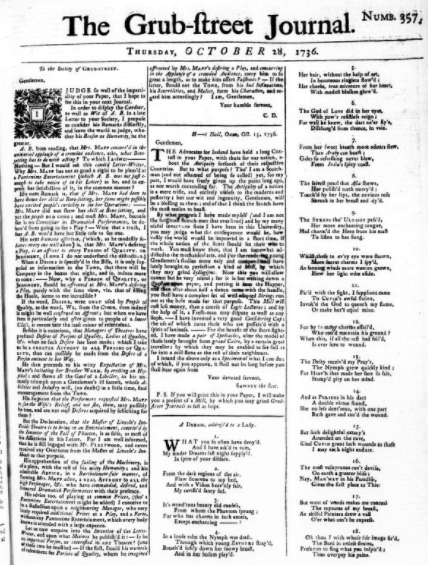The Grub Street Journal was a weekly satirical newspaper published from 8 January 1730 until 29 December 1737.[1][a]Grub StreetOnce a London street famous for its low-end publishers and hack writers, Grub Street has become a pejorative term for impoverished writers and works of low literary value. is a pejorative term that became synonymous with hack writers and low-quality journalism. Its first two editors were Richard Russel (1685–1746), a nonjuring clergyman[b]A nonjuror is someone who refused to swear an oath of allegiance to the monarch.[2] Russel had been vicar of Alfreston and Selmeston in Sussex until 1716, when he lost those livings owing to his refusal to take the oath.[3] and classical scholar, and John Martyn (1699–1768), who left the paper in 1733 to take up the position of chair of botany at Cambridge University. The Journal satirised medicine, theology, theatre, justice, and other social issues, and often contained contradictory accounts of events reported by the previous week’s newspapers, its writers commenting sarcastically on the inaccuracies printed by their rival publications.[4]
It is generally agreed that Russel was the main contributor throughout the Journal‘s run of 418 issues, but there has been much unresolved speculation surrounding the involvement of the poet and satirist Alexander Pope (1688–1744).[5] It seems unlikely that he was involved in the running or editorial direction of the publication, but he certainly contributed to the newspaper.[3]
The Journal was relaunched as the Literary Courier of Grub Street at the beginning of 1738, but survived for only a further six months.[6]
Notes
| a | Grub StreetOnce a London street famous for its low-end publishers and hack writers, Grub Street has become a pejorative term for impoverished writers and works of low literary value. is a pejorative term that became synonymous with hack writers and low-quality journalism. |
|---|---|
| b | A nonjuror is someone who refused to swear an oath of allegiance to the monarch.[2] Russel had been vicar of Alfreston and Selmeston in Sussex until 1716, when he lost those livings owing to his refusal to take the oath.[3] |

